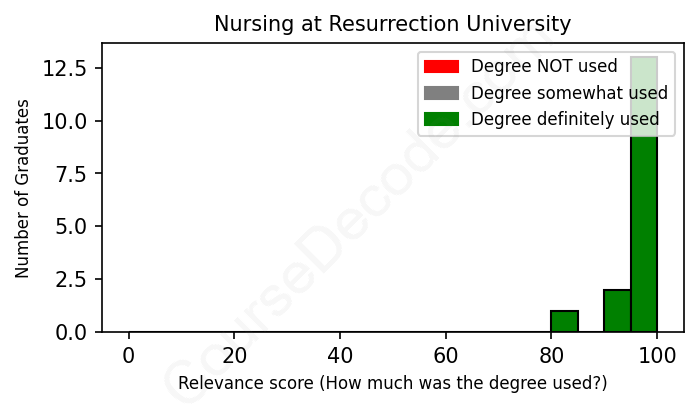
First, some facts. Of the Nursing graduates from Resurrection University we've analyzed , here's how many have used (or NOT used) their degree in their career:

These are estimates based on AI analysis of 16 LinkedIn profiles (see below).
The verdict? Great! Overall, with an average relevance score of 97%, Nursing graduates from Resurrection University have a substantially higher likelihood (+30%) of finding work in this field compared to the average graduate across all fields:
And for comparison, here's the chart for all profiles we've looked at across all degrees.
Also, after graduating, only 31% of these graduates have pursued further education other than another Bachelor's degree (such as a Masters degree or other), compared to the average across all profiles of 35%. This suggests a Bachelors degree is enough for most Nursing graduates, and it's normal to look for work straight after graduation.
See the details:
|
Relevance score: 100% We think this person has gone into a career highly relevant to their degree. We think this person has gone into a career highly relevant to their degree.
DEGREE INFOGraduated in 2020 from Resurrection University with a Bachelor's degree in Nursing. No other secondary education since. JOB HISTORY SINCE GRADUATIONRegistered Nurse Northwestern Memorial Hospital Jul 2020 - Present ABOUTNo information provided. |
The top 10 most common jobs done by the graduates we've analyzed (ranked most common to least) are:
When we look at the job titles for folks who graduated from Resurrection University with a degree in Nursing, it’s clear that many have landed roles that are closely connected to the nursing field—particularly as Registered Nurses or in specialized nursing positions. A significant number of graduates have worked as Emergency Room Nurses, Staff Nurses, and even Advanced Practice Nurses, demonstrating a strong commitment to direct patient care. These roles typically align well with what they learned during their studies, allowing them to apply their nursing skills in real-world settings. It’s no surprise that the majority of the jobs involve high levels of patient interaction and require a solid grounding in nursing principles.
However, not all jobs are perfectly aligned with nursing practice. Some graduates have taken on roles like Clinical Instructors or even positions that focus more on case management or administrative duties, where direct patient care isn't the priority. While these roles may still benefit from some nursing knowledge, they may not fully utilize the hands-on skills acquired during their education. Overall, though, it seems like a good chunk of these nursing graduates have found their place in the field, making a difference in patient care, which is what nursing is all about!
Here is a visual representation of the most common words in job titles for Nursing graduates (this is across all Nursing graduates we've analyzed, not just those who went to Resurrection University):

Graduates from Resurrection University with degrees in Nursing generally have pretty solid career trajectories after graduating. Right out of the gate, many of these graduates land their first jobs as Registered Nurses, often starting in intense environments like emergency rooms or specialized units such as pediatrics or surgery. This initial experience, especially in critical care settings, seems to set a strong foundation for their careers. Over the years, many alumni advance into more specialized roles or obtain advanced certifications, transitioning into positions like Nurse Practitioners, Clinical Educators, or case management roles within hospice and palliative care.
Looking down the line—about five to ten years post-graduation—it’s clear that a lot of these graduates are still very much involved in the healthcare field, often stepping into leadership and advanced practice roles. Some have transitioned into academic positions as instructors, which speaks to a desire to give back and educate future nurses. Overall, the data indicates that most of these individuals have stayed relevant to the nursing profession, building on their initial experiences and pursuing various pathways that capitalize on their skills and interests. So, if you’re considering nursing, it looks like there are plenty of fulfilling career paths waiting for you after graduation!
Getting a Bachelor’s degree in Nursing, including at places like Resurrection University, can be pretty challenging, though it really depends on your study habits and passion for the subject. It involves a lot of tough coursework, like anatomy and pharmacology, and you’ll also have clinical rotations where you get hands-on experience. Some people find it super rewarding, but you really need to be ready to manage your time well and work hard. So, while it’s not a walk in the park, if you’re dedicated and genuinely interested in nursing, you can totally handle it!
Most commonly, in the LinkedIn profiles we've looked at, it takes people 1 years to finish a Bachelor degree in Nursing.
Looking at these nursing graduates from Resurrection University, it seems like most of them have had a solid career path with decent earning potential. Many of them started in typical nursing roles and climbed the ladder to higher-paying positions, like Advanced Practice Nurse or Nurse Manager, which are definitely respectable pay scales. It’s also pretty common for nurses to transition into specialized fields, like the psychiatric or cardiac care roles, which usually come with better salaries. While it’s hard to say exact figures, nurses in these kind of positions typically make good money, especially with experience and moving into management or advanced practice. In short, these nurses are likely making a living that's, if not luxurious, certainly comfortable and stable, especially with the demand for healthcare professionals nowadays.
Here is a visual representation of the most common words seen in the "about" section of LinkedIn profiles who have a Bachelor degree in Nursing (this is across all Nursing graduates we've analyzed, not just those who went to Resurrection University). This may or may not be useful:

Here are all colleges offering a Bachelor degree in Nursing (ordered by the average relevance score of their Nursing graduates, best to worst) where we have analyzed at least 10 of their graduates: